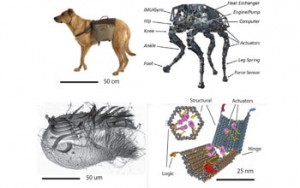 The National Science Foundation’s (NSF) Directorate for Computer and Information Science and Engineering (CISE) today announced two new Expeditions in Computing awards, providing each selected project team $10 million in funding over five years, representing the single largest investments made by the directorate in basic computing research.
The National Science Foundation’s (NSF) Directorate for Computer and Information Science and Engineering (CISE) today announced two new Expeditions in Computing awards, providing each selected project team $10 million in funding over five years, representing the single largest investments made by the directorate in basic computing research.
Established in 2008, Expeditions awards provide, “the CISE research and education community with the opportunity to pursue ambitious, fundamental research agendas that promise to define the future of computing and information.”
Farnam Jahanian, assistant director for CISE shares,
“The Expeditions in Computing program catalyzes large-scale, far-reaching and potentially transformative research motivated by deep scientific questions. These two new awards aim to apply our understanding of natural, biological capabilities to the development of revolutionary new computing and information technologies with tremendous potential for societal benefit.”
This year’s Expeditions projects are:
Molecular Programming Architectures, Abstractions, Algorithms and Applications
Lead PI: Erik Winfree, California Institute of Technology (Caltech)
With collaborators from: Caltech; Harvard University; University of California, San Francisco and University of WashingtonThis project will explore the incredible chemistry and molecular machinery of life, expanding advances made under a previous NSF award. With principles of computer science at its core, this new Expedition project aims to establish solid foundations for molecular programming–that is, systematically programming the behaviors of a wide array of complex information-based molecular systems, from decision-making circuitry and molecular-scale manufacturing to biomedical diagnosis and smart therapeutics.
Erik has been involved with the Computing Community Consortium (CCC) as a mentor to a David Doty, a Computing Innovation Fellow, from 2010-2012. David worked on theoretical projects in self-assembly and computation by chemical reaction networks during his fellowship.
Visual Cortex on Silicon
Lead PI: Vijaykrishnan Narayanan, The Pennsylvania State University
With collaborators from: University of Southern California; Stanford University; York College of Pennsylvania; University of California, San Diego; University of California, Los Angeles; University of Pittsburgh; Massachusetts Institute of Technology and The Pennsylvania State UniversityThis project envisions a holistic design of a machine vision system that will approach or exceed the capabilities and efficiencies of human vision, enabling computers to not only record images, but also to understand visual content at up to a thousand times the efficiency of current technologies.
A summary of past expedition projects can be found here.











Trackbacks /
Pingbacks